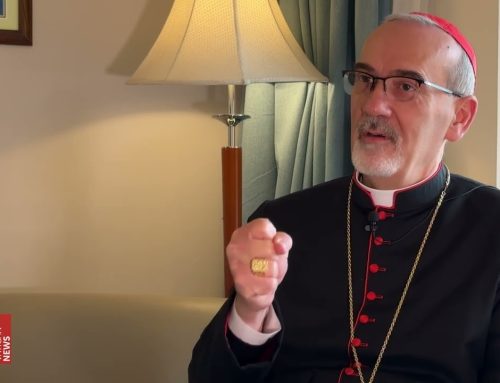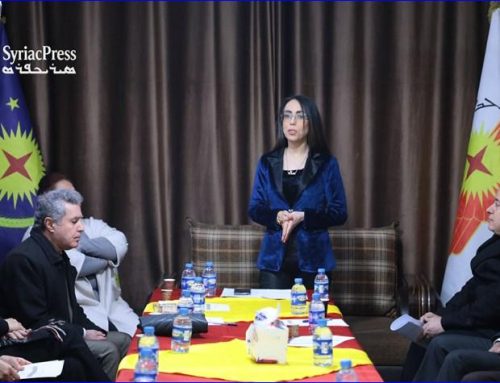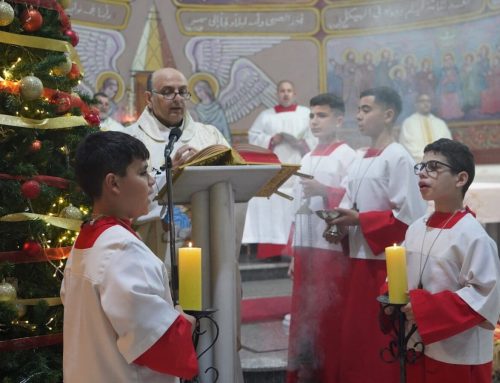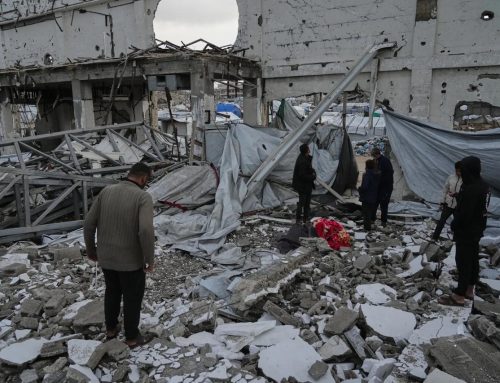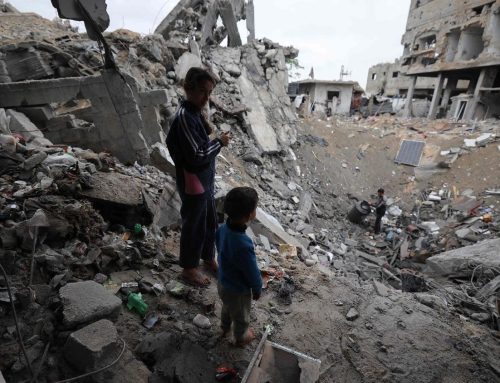Since this was the first time for Mrs. Steimoeggen to visit Gaza it was difficult to compare with previous visits but for her Gaza appeared much poorer than the West Bank and people are obviously in a very difficult situation.
Visiting Gaza – Liv Steimoeggen- Area Representative Middle East (Norwegian Church Aid)
Since this was the first time for Mrs. Steimoeggen to visit Gaza it was difficult to compare with previous visits but for her Gaza appeared much poorer than the West Bank and people are obviously in a very difficult situation. Leaving Jerusalem at 6:45 and reaching Erez border at 8:30 it took one more hour to go through where Mr. Constantine, director of the Near East Council of Churches (NECC/DSPR/ MECC) was waiting on the other side.
First visit was to the Near East Council of Churches (NECC) office where distribution of the emergency funds for the poor was going underway in a well organized manner. During the two days all of NECC’s projects were visited in addition to a meeting with members of the Board for lunch. One of the Board members apologized for not participating in the lunch, his son had been refused exit from Gaza in order to attend studies in Turkey. There were many similar stories.
While out of 1.5 million Gazans there are only 2500 Christians in Gaza, the Church organizations extend substantial aid, and services in health and education to a very large extent. The unemployment rate is very high since no import or export is allowed, only basic food commodities. Due to this most economic activity has stopped. Moreover before the year 2000, 15 000 people used to bus to Israel for jobs. Now people suffer severely from restricted movements. During the short time of the visit there were many power cuts, which impact people’s daily life and work dramatically.
The political situation and advocacy
A major concern is the political situation and how to approach it. Everyone who has a chance should go to Gaza to get an idea of the difficult situation people are in. This is a clear recommendation. "We are not Hamas, why are we punished?" was a statement frequently heard. Whatever one party has done wrong the conflict cannot be solved without dialogue at the end. The more isolated Gaza remains the more devastating the social and humanitarian situation gets and the more the radical forces will influence the development inside. Shared by a Christian: "I hope the Israelis will not take out the moderates within the Hamas leadership. If they do, we are left with people below the leadership level who have less experience and who are even more radical."
As a follow up for the launching of the Palestine Israel Ecumenical Forum (PIEF) in Amman in June there is going to be a strategy meeting in Geneva in September. Besides the Israeli Occupation and land issues between Israel and Palestine, focus on the right to movement is a burning issue in Gaza as well as the West Bank. A focused approach involving all levels from the grass root and all the way to the top could be hopefully and have impact on the daily life of Palestinians.
Institutions
Vocational Training Centres (VTCs)
The visit started on the top floors of the NECC office where vocational training classes for women are conducted. A group of 13 elderly women were sewing uniforms for the schools and the clinics. It is a project aiming at assisting marginalized women, widows and poor women, who don’t have any other income opportunity. They receive 100 USD per month. In the next room there was a sewing class, an 11-months course. Some of the most advanced can be engaged with the sewing cooperative at the centre. The cooperative receives sewing orders from people in Gaza and presently 6 girls work there. The last class visited was for secretarial training. The women learn typing, and will later advance to computers. The centre has 30 computers. Education in English is part of the programme. It was said that 56% of the drop-out students who enroll at the vocational training centres are illiterate or semi-literate. Due to this the centres also provide literacy classes. 70-80% of the graduates were said to get a job after the training.
Family Health Centres
The first Family Health Centre visited was in Al Darraj. The second was in Shijaia, the oldest in Gaza. 75 000 people live in Shijaia, which is the poorest area in Gaza city. The third Centre visited was in Rafah.
The Family Health Centres are moved from site to site according to the needs. If a new centre is opened by another NGO or the authorities in the same area, NECC move to another poor area without any clinic to avoid duplication. Some of the staff alternated between the centres according to a fixed plan. At the centers there are mid-wives, staff nurses, laboratorian, pharmacist, doctors and a supervisor. One female doctor is available three days a week. 30-50 patients are treated per day at each centre. Since the summer 2006 the services have been provided for free because people cannot afford to pay. The success of the centers is due to the close cooperation with the community. The people are involved in the discussions on needs and priorities.
When asked about specific problems the staff mentioned poverty and unemployment. Related to health, anemia was quite common and 60% of the children were said to be malnourished. Many women suffer from infections caused by the salt water. The normal number of children per family was said to be 6-8 children. However women’s interest in family planning has increased, probably due to the increased awareness about its importance. Trauma and psychological stress is quite common. NECC coordinates with other NGOs for approaching traumas and people from other institutions/organizations are engaged to lecture on psychosocial problems and how to deal with it.
When asking the staff nurses about domestic violence they confirmed that it occurs and now more so because husbands stay at home without jobs. The pressure and stress have increased the problem. On the visit to the clinic in Rafah the issue of "honour killing" was also brought up. It was confirmed that it exists. People seemed to be a bit hesitant when these questions came up.
Community workers
A graduation of a group of female community workers happened to take place in Gaza city. This is a 6-months course for women. As part of the course they visit all households in the area to learn about the situation of the families. The visits are followed by discussions in class and possible interventions. They learn about the social issues and some of the graduates get engaged in the health centres and some become volunteers. In Rafah a community workers’ group had a lecture. When discussing with them they were very vocal and active and they expressed their strong wish for more education, they were eager to learn and help their communities. Approximately one third of the girls were wearing "khemar" (totally covered showing only their eyes).
Al-Ahli Arab Hospital
The hospital was built in 1882 by British missionaries (CMS). From 1952 it was run by the Baptist Church of the US. In 1982 the Episcopal Church under the Diocese of Jerusalem took over. It is a relatively small hospital operating with 50 beds but can increase to 100 during emergencies. The hospital provides a variety of services. They have an agreement with UNRWA who pays for the reservation of a certain number of beds for the poorest of the poor. The deficit is paid by various donations.
Al Ahli Arab is a Christian hospital. "We want to let people feel Christianity, not through preaching but through doing." This is the motto of Dr. Suhaila, the Hospital Director. She stressed that it is an inclusive hospital serving everyone regardless of political or religious affiliation. It has happened that wounded people from both Fatah and Hamas have ended up in the same room, gradually they started greeting each other and talking. Most of the other hospitals are affiliated to factions. As a principle Suhaila has refused to engage a guard and weapons inside the hospital are strictly forbidden.
Entering Al Ahli Arab compound was like coming to an oases in Gaza, with a small garden in a clean and tidy environment. The hospital has managed to maintain the services in spite of the difficult situation. In the government hospitals they now stop working around 11am. The Gaza Community Centre provides psychosocial support when needed. The activities of the hospital have expanded to the communities and areas without medical services, assisting victims of bombardments and incursions. However they find it more appropriate to bring the patients to the hospital where they get free medical assistance, transportation and a light meal. The hospital provides first aid training for women and they also have provided food baskets, clothes and school bags for children who are in a situation of emergency. There is an increase of outpatients of 20% and the number of operations has doubled. The hospital’s budget is very tight and so far in 2007 they have a deficit of USD 700 000. The power cuts add to the expenses because the fuel/electricity has increased with 10%.
Gender roles
The gender issue was raised during the visit to the hospital and especially the occurence of gender based violence. Suhaila responded by saying that women at all levels are the most vulnerable. Women always tend to excuse men and most women suffer, which will again affect the way they bring up their children. The family law doesn’t provide full rights to divorce and women are under severe pressure from their families. The threat of instability at home contributes to increase the number of births because people find security in their children in their old age. An increase in the number of women who turn to religion can be observed and the Quaran tends to be interpreted wrongly. On the issue of honor killing the closed societies were mentioned where women are not allowed outside without accompaniment. Already from the age of 8, girls are taught "you should/you should not". In a normal society there should be relationship between the sexes.
According to the Representative of Norwegian People’s Aid there had been 30 registered so-called "honour killings" in Gaza in 2007. The Palestinian Working Women Society said that 12 out of 30 women killed in 2007, were due to "honour killing" while 72 were injured. Whatever the actual figures are, even one is one too many.
Being a woman director in the male dominated society of Gaza as in the case of Suhaila, is not easy. It takes hard work and commitment for a women to reach the level of respect and acceptance both by staff, the society and authorities. Those who manage are extremely important serving as role models for young women, showing that it is possible. Without any women in leadership positions the way towards equal opportunities for men and women will be much longer and more difficult. Gaza and the West Bank need more women like Suhaila.
The Youth
The focus on youth through the Vocational Training Centres and women through the Family Health Centres appear appropriate and good reaching the grass-root. Contributing to democratic approaches and open and inclusive attitudes among young men and women seem decisive for the future development of Gaza.
With the increasingly difficult situation in Gaza, especially from the winter 2006, it is very important to support institutions like Al Ahli Araab, the Vocational Training Centres and the Family Health Centres in order to maintain their services to the people. The leadership stick to their principles and keep going in spite of conflicts and fractionalization. It is an excellent example of continuity and stability in a chaotic environment where people feel very uncertain about the future. They are the best possible witnesses of positive Christian presence and “doing” and examples of Christians representing moderate and mediating forces in their societies.
"Christianity is not about preaching, it is about doing", a valuable and guiding principle for future assistance.. With more resources there are potentials for further strengthening and developing the interventions and make them even more powerful.

